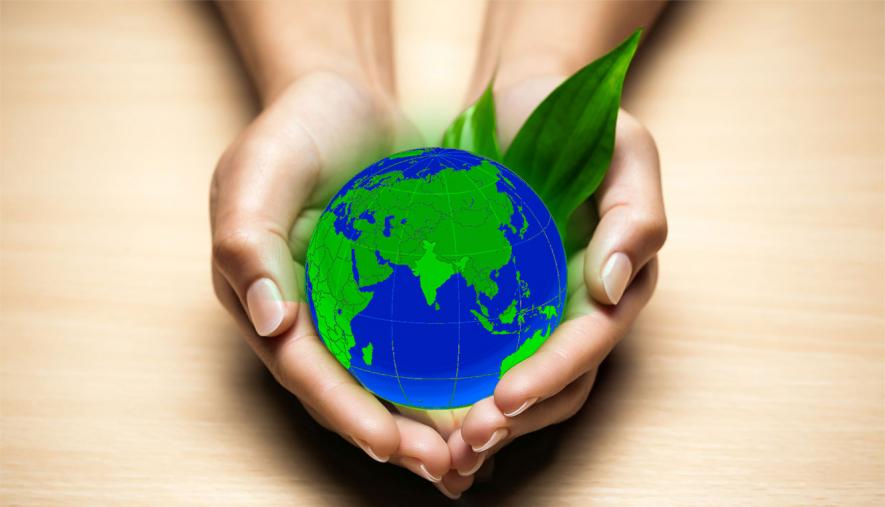World Biological Diversity Day: Our Solutions are in Nature

No better day than International Biological Diversity Day 2020 to remember that we are part of the nature, not separate from her. Seers described this relationship as that of one big universal family, the vasudeva kutumbakam where all support and sustain each other, from the slimy earthworm to the mighty elephant. We learnt over our long civilisational history that sometimes difficulties such as famines and floods hold lessons for us about our role as stewards and children of Mother Nature. And we learnt that there is a planetary mindfulness that allows us to exult as a culture in the mutual interdependence of life.
Our ancestors toiled for centuries so we could be beneficiaries of diverse climate-resilient and nutritious seeds. As a result, today Indians have the largest diversity of plants and foods anywhere in the world. India accounts for over 2,00,000 varieties of rice alone. We honoured our seeds, from Barley to Ragi, with sacred rituals for we knew that they bestowed health upon us. We prayed to the nine goddesses during navratri and offered a sacred seed to each. From birth to death our biodiversity was conserved through hallowed rituals. In many Indian communities brides still bring a gift of native seeds and exalted spices such as turmeric to their married home.
All communities across India—and this is more evident among native tribes—have myriad forms of biodiversity entwined with their daily lives and revered observances. In fact the word “sugarcane” in Sanskrit is “ikshu” and the dynasty of the mythological king Rama was Ikshvaku. Uncanny coincidence?
The animal family was not left out either. They were sanctified as companions or steeds of gods and goddesses. Even the most hated pestilence in the West, the rat, is associated with the god Ganesha. Subcontinental civilisation saw beyond the anthropocentric myopia and valued each being as divine, for all were seen to contribute to turning wheel of life. Sadly, these were just pagan rituals or superstitions for the officers of the East India Company. Baffled by their enigma they were quick to rechristen these seeds and we were left with the mundane Pigeon Pea, the Cowpea, Horse Gram and so on.
With the mighty gunboat and its lust for gold, the colonist focused on reversing the subcontinental way of life. They infected its people with a virus for the conquest of nature, which was contradictory not just to Indian life, but of all civilisations across the world, including the pagan traditions of Europe, which were repressed during the Great Inquisition in medieval Europe. From the native tribes of the Americas to the Chinese, all affirmed human life as a part of nature and the Age of Imperialism began the great fall into a desperate hell of pillage, loot and rape of the earth and all her living beings, all for the profit of the great pirate overlords.
But is the conquest of nature over? No, this conquest has only evolved. Instead of the East India Company we have larger behemoths: agri-giants that survive on plunder and bio-piracy. India, a land of diversity, is losing her true wealth—her connection with biodiversity, with seeds, medicinal plants and animal genetic diversity. We are now at Contagion Stage 10 of this other virus and still we revel in our separation from nature. An example—from the Gir to the Ongal we have destroyed our cattle wealth with artificial insemination. We have sacrificed the Nandi, or bull, to the tractor and made oxen redundant to agriculture.
It is then no surprise that the diversity of our thali [dietary variety] too has shrivelled to a handful of crops and sub-varieties of fruits, cereals and vegetables. Millets and local varieties of grain have disappeared from our diet, replaced by commercial varieties, while our fields have become a eulogy to monoculture cropping. It took thousands of years to evolve each variety and crop and yet, in a little less than 50 years, we have destroyed generations of breeding and cultivation.
But at the national level there are greater threats. Indian plant genetic resources (PGR), of which India has among the highest in the world, are being pirated abroad, sometimes due to the laxity of enforcers and other times illegally. Nevertheless, treaties such as the ITPGRFA and UPOV are trying to bully India into surrendering all its PGR for corporate exploitation, while receiving minimal remuneration and benefits for the communities that have co-evolved these plants and seeds. There is also an attempt to subvert our Biodiversity Act and undermine the National Biodiversity Authority through these treaties.
International seed companies including Chinese ones are allowed to control 100% subsidiaries in India, accessing strategic PGR and exporting parent lines of our varieties to their nations. Meanwhile, Indian companies cannot own companies in China, Thailand and many other countries where exports of parent lines of varieties is prescribed. We need to have a more nationalistic FDI policy for PGR as it is this treasure trove that will prepare us to face challenges such as climate change. Our next policy step to conserve diversity should be to have a strong protections for farmers and their right to breed and co-evolve newer varieties. As this year’s slogan for biodiversity day, Our Solutions are in Nature, suggests, we must harness the wild varieties and land races for meeting newer challenges. But this should be done sustainably, involving local communities and farmers instead of patented technological alternatives, which are expensive and promote profiteering.
MS Swaminathan, father of the Green Revolution, has stressed numerous times on how Indian biodiversity has the potential to meet all our needs, that we do not need gene modifications or other interventions such as CRISPR.
We must look towards nature and her abundance for solutions. Each of us has to embrace biodiversity-based products. Not only will it be economical but also healthier. Starting from our plate, we can include one millet meal or local varieties of rice/wheat apart from Basmati and, trust me, hundreds of aromatic, medicinal and tasty varieties are available in each city and village. This will increase the biodiversity of our gut and improve health. We need to also bring back local native vegetables and prefer what is seasonal and locally-grown over vegetables that have been in cold storage.
Even when buying processed foods, we must pick those which are biodiversity-based and support native tribes. In our clothing choices, we need to get rid of the hegemony of Bt Cotton. It is about time Indians, like conscious citizens elsewhere, choose cheaper alternate fabrics and support hand-loom products and sustainable clothing collectives.
We must involve processes such as bio-mimicry and evolve technologies that work with the earth and not against her. Circular and non-polluting economical policies are the need of the hour. Finally, each thing we eat, touch and feel is nothing but transformed nature. So we need to reject the false separation from nature. The problems and solutions are both part of nature. What we understand as problems are so because they risk human survival, but may not bother nature as much.
We need embrace the vast global family and bring biodiversity and sacredness back into our lives. We need to dispel warmongering against nature for profit and embrace earth’s abundance. As we change our behaviour, language which treats nature as a dead object. We need remove the “it” to denote nature and refer to her as the deity she truly is.
The author is director, policy and outreach, National Seed Association of India. The views are personal.
Get the latest reports & analysis with people's perspective on Protests, movements & deep analytical videos, discussions of the current affairs in your Telegram app. Subscribe to NewsClick's Telegram channel & get Real-Time updates on stories, as they get published on our website.
























